Table of Contents
Well-tempered, loyal, and energetic dogs. Let me introduce you to Ireland's Irish Setter.
Bred to be gundogs, the Irish Setter dog grew in popularity due to his beautiful mahogany coat and enthusiasm as a bird dog.
Don't ever listen to whoever says that blondes have more fun. You'll probably argue to differ if you own or have encountered an Irish Setter.
These redhead dogs are affectionate, intelligent, and known for being excellent family dogs.
With its elegant build, this breed is a great sporting dog. Their athleticism, grace, and enthusiasm are just perfect.
Irish Setters are incredibly likable and adventurous dogs. They are always game for any fun activities.
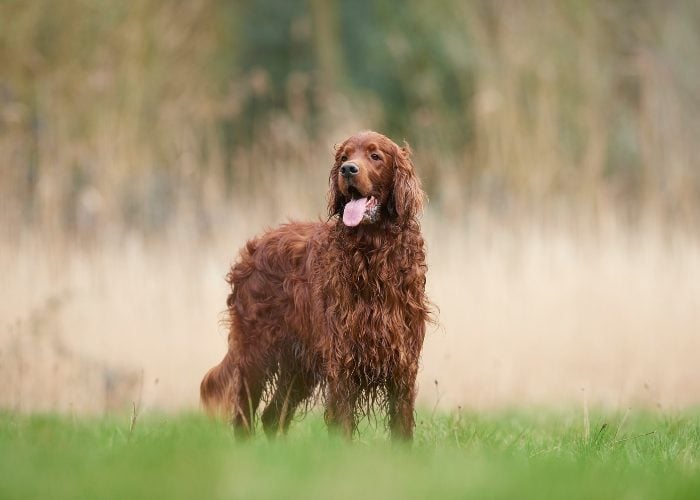
Irish Setter History
The Irish Setter dog breed, of course, originated in Ireland.
These beautiful dogs were developed in the 18th century and probably resulted from mixing English Setters, spaniels, pointers, and Gordon Setters.
Setters are dogs that locate game birds using their sharp sense of smell. Once they've found a bird, they'll show the hunter by “setting” down on their belly.
In the old days, setters were partnered with trained falcons and hunters that used nets. But in this day and age, setters are gundogs working side-by-side with hunters with rifles.
Irish Setters used to be red and white before “landmark” dogs influenced them, and then they became solid red.
It is said that the Irish Earl of Enniskillen has started the hype for solid red dogs. And by 1812, all of his dogs are Irish Setters.
In 1875, Elcho, the first Irish Setter, was imported to the United States. They were popularity grew instantly through the showings and also in the fields.
And in 1878, the American Kennel Club recognized the first Irish Setter dog breed, Admiral, making them one of the organization's oldest breeds.
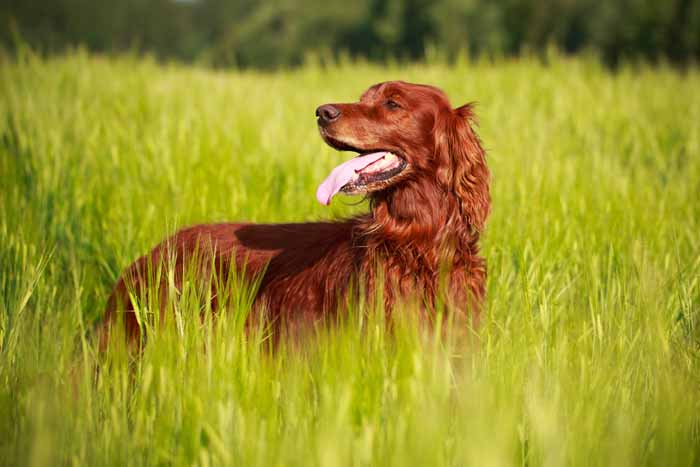
Irish Setter Physical Traits
Irish Setters are medium to large-sized dogs. These dogs are famous for their stunning coat. They are considered one of the prettiest breeds in the world.
With a gorgeous shade of mahogany or rich chestnut red coat, it is long and straight all over the body.
Also, with long and silky feathering on the ears, backs of the forelegs and thighs, tail, belly, and chest.
Originally developed to be gundogs, Irish Setters have an athletic build. They have deep chests, little waists, and slim hindquarters.
A male Irish Setter stands 27 inches at the shoulders and weighs around 70 pounds. On the other hand, female Irish Setters stand at 25 inches and weigh an average of 60 pounds.
Irish Setter Temperament
Now, let's get right into their personalities. Knowing their temperament can greatly help you if you plan to adopt an Irish Setter.
This can tell you if you and the dog breed are compatible with your lifestyle.
Irish Setters are affectionate and playful dogs, always ready for a good time. They are the perfect dogs for outgoing people.
However, they tend to be mischievous dogs from time to time. Make sure to lock your cabinets and drawers as they tend to raid them and make a mess out of them.
Irish Setters also love people, making them not the best options for owners looking for guard dogs.
Fortunately, they are great watchdogs and will bark to alert you if there are visitors or intruders near your property.
Irish Setters have trouble maturing and will keep their puppy energy for years or throughout their lives.
But when it comes to their overall temperament, remember that it can be affected by multiple things. For instance, heredity, training, and socialization all impact a puppy.
You can also look at the parent's or one of the sibling's temperament to help determine their personalities.
At the same time, you can examine the litter. Puppies with nice temperaments are curious, playful, and willing to approach people.
Living with an Irish Setter
Irish Setters are best suited for homes with large spaces. If you live in a house with a large fenced-in yard, your Irish Setter will enjoy this as they can run around and play.
Remember that they are hunting dogs. They'll need plenty of activities to keep them healthy and happy.
It is also advised that these dogs should live indoors with their family. Never let an Irish Setter alone in the backyard or a kennel, as these dogs are prone to separation anxiety.
And just like any other dog breed, the Irish Setter can benefit from early socialization.
Expose your pup to different people, environments, sounds, and experiences. Early socialization can help your pup be a well-rounded dog.
If you're living an active lifestyle, the Irish Setter is the perfect buddy for you. If you're fond of jogging or running, these dogs will be great companions.
Irish Setters also love children. But they are best fitted for older enthusiastic children since they can be too rowdy for toddlers.
As parents and pet owners, we must supervise interactions between the two for their safety. Teach your children how to play and interact with the dog properly.
Training your pup and teaching your children can prevent biting, ear or tail pulling, or any other exchange that can hurt them.
Life would be easier if the child or the puppy grew up together. Similar to other pets such as cats and other dogs.
However, they might see birds and other small animals as prey because of their hunting instincts.
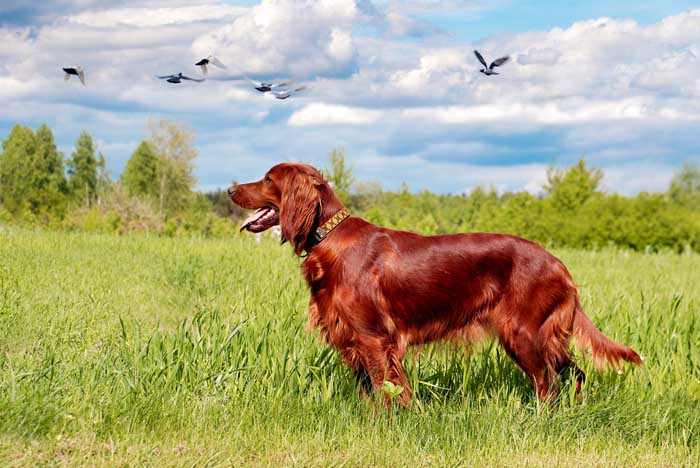
Training and Exercise
Irish Setters have plenty of energy since they are active dogs. They require at least an hour of daily exercise.
Exercise can be done in different ways, but their favorite activity is running.
If you love jogging, the Irish Setter is the perfect match for you. Exercise can also be in the form of swimming or playing fetch.
However, a puppy Irish Setter's exercise requirements differ from an adult's.
If your puppy is between eight weeks to 4 months old, you can enroll him in puppy kindergarten once or twice a week.
Here, your puppy can be exercised, trained, and socialized. But playing with him every morning and evening would strengthen your bond.
Irish Setters are easy to train due to their intelligence. In training, you have to be firm and consistent. They respond best with positive reinforcement, not with anger or physical force.
You can also try reward-based training. Give them his favorite treats when he does a good job. But remember to switch the rewards and activities to avoid boredom.
Since they are very curious dogs, crate training is essential for an Irish Setter puppy. Their curiosity tells them to examine any object with his mouth.
Crate training will not only keep your puppy safe from eating unwanted things, but it can also secure your belongings.
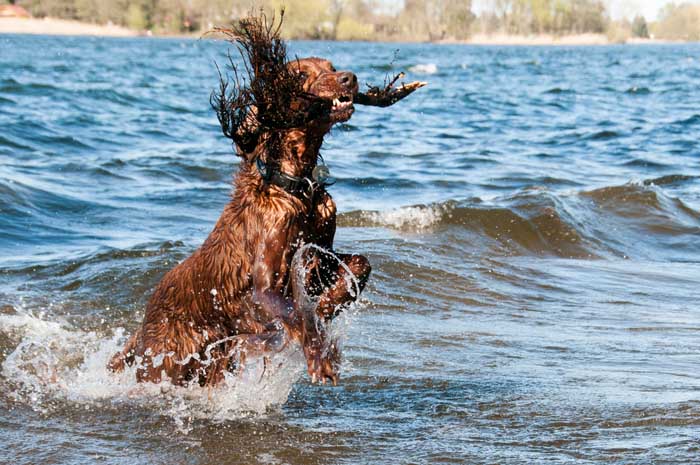
Health Care
The Irish Setter is generally a healthy dog with a life expectancy of 12 to 15 years!
However, like other dog breeds, they are susceptible to certain health conditions you should look out for.
That's why it's best to find a reputable breeder if you're looking to adopt a dog. Responsible breeders can give you health clearances for the puppy and its parents.
Below, we've gathered a few health problems that Irish Setters are prone to.
Hip Dysplasia
Hip Dysplasia is a genetic condition wherein there's a distortion in the socket of the joint and ball.
When your dog suffers from hip dysplasia, keeping its normal weight and engaging it in activities that encourage joint therapy is crucial.
If they can't keep their normal weight, they may create issues in the bone and joint as it is the most strained during activities.
Veterinarians may prescribe medications for pain relievers and supplements. You can also prevent this condition by keeping them active but not injuring them.
Swimming or treadmill walks are great exercises to help prevent this kind of health issue.
Progressive Retinal Atrophy
Progressive Retinal Atrophy, or PRA, is a problem for the Irish Setter.
This degenerative disease affects the rod and cone cells in the eyes, leading to blindness.
It is also a genetic disease known to have no treatment yet. Unfortunately, this disease can progress quickly from a year or two.
It is best advised to have your Irish Setter frequently checked to reduce the risk of this condition.
Osteochondrosis Dissecans
Osteochondrosis Dissecans is an inflammatory condition that occurs when joint cartilage growth is improper.
Some indications could be swelling in the affected joints, limpness, or lameness in the affected leg or legs. Surgery can help treat this painful disease.
Hypothyroidism
Hypothyroidism is the static function of the thyroid gland. In Hypothyroidism, the dog's metabolism is slowed down.
The immune system strikes the thyroid gland as it does not acknowledge it. It is also usually a hereditary condition.
For Irish Setters who are experiencing lethargy, slow heart rate, weight gain, excessive shedding, and high cholesterol, it’s best to have them tested by a veterinarian.
The veterinarian may give maintenance and recommended diet. It’s best to have this condition checked and addressed immediately.
Gastric Torsion
Gastric Torsion or bloating in dogs is a gastrointestinal problem where-in a dog’s stomach expands due to it overflowing with fluid, food, or gas.
This can be a fatal case if left untreated. In some cases, due to bloating, blood is trapped in the stomach preventing return and proper flow.
Prevention includes preventing your dog from doing activities right after a meal, eating too fast, eating large meals throughout the day, and stressing them out.
Treatment will depend on your veterinarian's observation.
Epilepsy
Epilepsy is a disorder that causes mild or severe seizures in dogs.
It can be genetic, caused by metabolic disorders, brain injuries, or tumors. Unfortunately, the cause of idiopathic epilepsy is still unknown.
Veterinarians may administer anti-seizure, but it can only decrease the severity of the seizure.
Ensure your Irish Setter is checked immediately to provide the right medication for the condition.
Irish Setter Grooming
The Irish Setter's grooming needs may be moderate overall, but like training and exercise, grooming is also essential to caring for dogs.
Irish Setters have long, beautiful, and thick coats of fur. Brush them at least every two to three days to keep their hair shiny, healthy, and tangle-free.
You can bathe your Irish Setter a couple of times a year. Unless they get muddy or dirty when they play or after a hike, they'll need a good ol' thorough bath time.
It's also important to clean and check their ears weekly. Check if their ears smell bad, swollen, or tender; these are a few signs of an ear infection.
Brush their teeth at least two or three times a week. If you can brush them daily, even better! This can help prevent and remove tartar buildup and other bacteria lurking inside.
When it comes to their nails, a great rule of thumb is not to let their nails touch the ground. Clip or trim them at least once or twice a month.
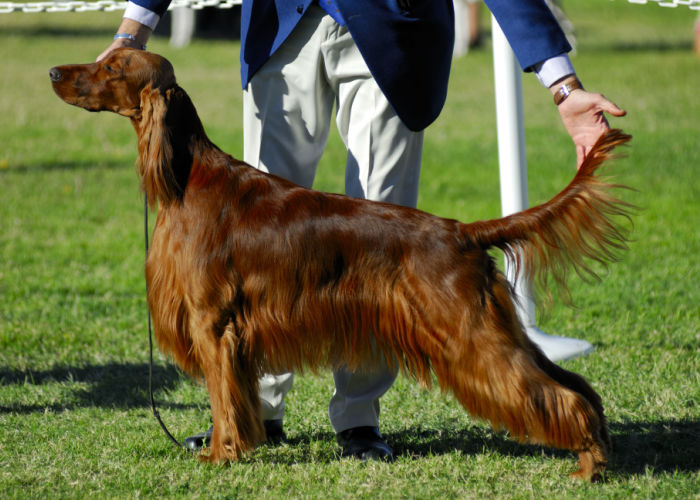
Frequently Asked Questions About Irish Setters
Is an Irish Setter a good family dog?
Yes, Irish Setters are great family dogs. They are sweet-tempered dogs that are great companions for people who live an active lifestyle.
Irish Setters are always down for playtime and cuddles. They love to give and receive affection from family members.
Are Irish Setters intelligent?
Although they are mainly recognized for their magnificent appearance, Irish Setters are also considered intelligent dogs.
They are easy to train, and they are considered excellent sporting dogs.
Are Irish Setters prone to anxiety?
Unfortunately, these beautiful and highly intelligent dogs are prone to separation anxiety. They are not recommended to be alone for more than two hours.
Separation anxiety can lead to destructive behaviors when they are left alone too much.
That's why this dog breed must be crate trained so that they'll have a relaxing space while you are out.

Irish Setter Dog Breed Profile: Summary
Originally bred to be gundogs, the Irish Setter dog breed has come a long way.
Irish Setters are famous for their magnificent coat and are considered one of the world's prettiest dog breeds.
But don't let their beauty distract you from the fact that they are also highly intelligent dogs. These dogs are easy to train and can contend in sports or agility competitions.
If you're looking to adopt an Irish Setter puppy, ensure that you're adopting from a reputable breeder to avoid genetic health conditions.
These dogs are prone to numerous health diseases, such as hip dysplasia, Hypothyroidism, epilepsy, and progressive retinal atrophy, to name a few.
Irish Setters are the perfect dog for outgoing and adventurous people. They are also affectionate dogs that love to cuddle with their family.
With proper training, this dog breed might be the next great addition to your family.













